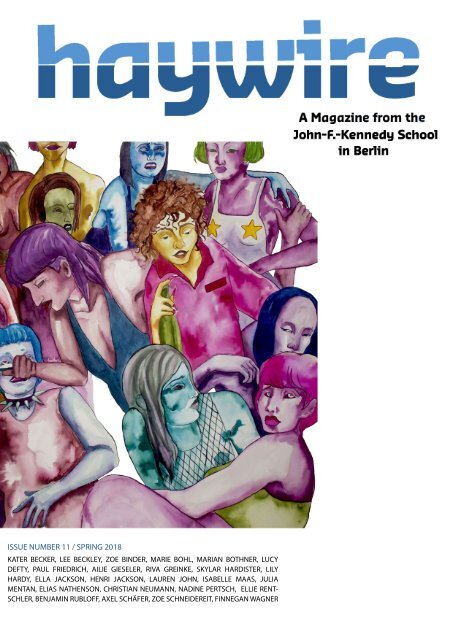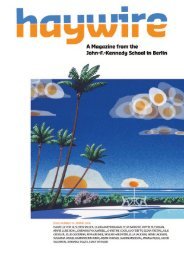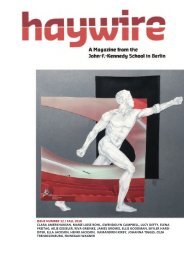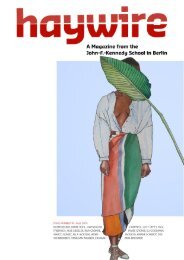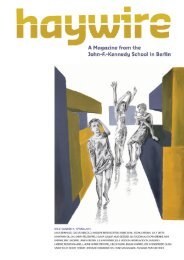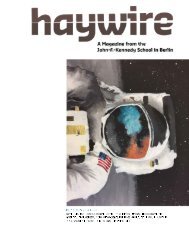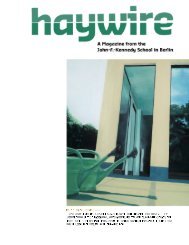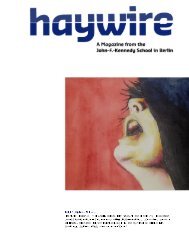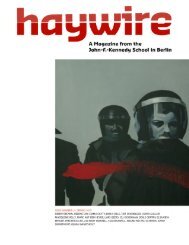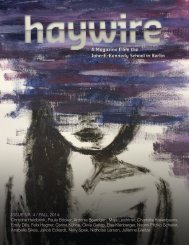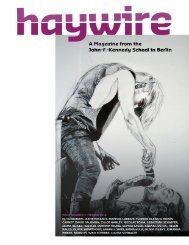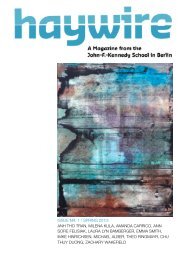You also want an ePaper? Increase the reach of your titles
YUMPU automatically turns print PDFs into web optimized ePapers that Google loves.
ISSUE NUMBER <strong>11</strong> / SPRING <strong>2018</strong><br />
KATER BECKER, LEE BECKLEY, ZOE BINDER, MARIE BOHL, MARIAN BOTHNER, LUCY<br />
DEFTY, PAUL FRIEDRICH, AILIE GIESELER, RIVA GREINKE, SKYLAR HARDISTER, LILY<br />
HARDY, ELLA JACKSON, HENRI JACKSON, LAUREN JOHN, ISABELLE MAAS, JULIA<br />
MENTAN, ELIAS NATHENSON, CHRISTIAN NEUMANN, NADINE PERTSCH, ELLIE RENT-<br />
SCHLER, BENJAMIN RUBLOFF, AXEL SCHÄFER, ZOE SCHNEIDEREIT, FINNEGAN WAGNER
CONTENTS<br />
PUBLISHER’S NOTE<br />
by Henri Jackson, <strong>11</strong>a<br />
POEMS<br />
the poisonous fruit by Lucy Defty, <strong>11</strong>a<br />
Definition: any__of the family ___, having a compact body and short legs by Ella Jackson, 9c<br />
Connotation by Henri Jackson, <strong>11</strong>a<br />
Ash by Henri Jackson, <strong>11</strong>a<br />
Third Places by Marie Bohl, <strong>11</strong>a<br />
The Metaphor - A Bridge I’ll Burn When I Come To It by Anonymous<br />
Chinchero by Dr. Julia Mentan, English Department<br />
Excerpts from my diary by Marian Bothner, 12d<br />
What I’m Trying to Say by Zoe Schneidereit, 12d<br />
A Jaded Girl by Marie Bohl, <strong>11</strong>a<br />
Panchreston by Lily Hardy, 12d<br />
Curious Incident by Isabelle Maas, 12d<br />
Knock-Out by Lee Beckley, English Department<br />
Why Don’t You See Me by Zoe Binder, <strong>11</strong>d<br />
Untitled by Anonymous<br />
A Guide To Self-Love by Nadine Pertsch, <strong>11</strong>a<br />
The Hustle by Elias Nathenson, 12d<br />
Victoria by Marie Bohl, <strong>11</strong>a<br />
POETRY INTERVIEW WITH MARIE BOHL<br />
WAS ZUR POESIE?<br />
by Henri Jackson, <strong>11</strong>a<br />
VIGNETTES<br />
Deadboi by Ellie Rentschler, <strong>11</strong>a<br />
OSCAR by Paul Friedrich, 12a<br />
SHORT STORIES<br />
DIE ZAHL, DER NAME UND DAS SEIN<br />
by Axel Schäfer, Ethics Department<br />
ESSAYS<br />
ANALYSE VON THEODOR STORMS “MEERESSTRAND”<br />
by Christian Neumann, French Department
Publisher’s Note<br />
by Henri Jackson, <strong>11</strong>a<br />
“Think left and think right and think low and<br />
think high. Oh, the thinks you can think up if<br />
only you try!” - Dr. Seuss<br />
Our imagination and creativity are<br />
endless. I like to think of them as black holes.<br />
Behind their dark veils, beyond what we call<br />
reality, one can find every thought we’ve never<br />
had, boundless secrets,<br />
untold tales, the future,<br />
haywire |ˈhāˌwīr|<br />
adjective informal<br />
erratic; out of control :<br />
her imagination went haywire.<br />
ORIGIN early 20th<br />
century (originally U.S.):<br />
from HAY + WIRE, from the<br />
use of hay-baling wire in<br />
makeshift repairs.<br />
and portals to new dimensions<br />
...we think... anything<br />
could be back there. Like<br />
any black hole, our minds<br />
get sucked into our imagination<br />
if we are not careful.<br />
You see, the force pulling<br />
us reels from the fountain<br />
of our inspiration, an unlimited<br />
power that always<br />
renews with every observation<br />
we make, often making the force too<br />
strong to resist. Before we realize what is happening,<br />
the force of inspiration has captivated<br />
us in its tractor beam and we have lost ourselves<br />
in the world of our thoughts, time stops<br />
and space freezes. The suction power pulls us<br />
in so often that it almost seems commonplace<br />
and becomes subconscious. The beautiful<br />
thing is that even if you personally do not visit<br />
your black hole too often, inspiration is utterly<br />
unlimited and can be found everywhere - no<br />
matter who you are. That makes creativity our<br />
human superpower, a superpower that everyone<br />
possesses. One must simply put oneself in<br />
a mentality that allows us to be consumed by<br />
the inspiration surrounding us; perhaps easier<br />
said than done.<br />
Welcome to JFKS’ black hole! <strong>Haywire</strong>,<br />
as the name literally reveals, goes out<br />
of control, enters the eternal enigma that is<br />
our imagination and attempts to reveal just a<br />
little bit of the infinite chaos<br />
beyond the black veil. I<br />
have dedicated this issue<br />
to embracing this limitless<br />
nature of creativity, which<br />
meant expanding <strong>Haywire</strong>’s<br />
boundaries. For the<br />
first time ever, <strong>Haywire</strong> is<br />
publishing the music of the<br />
JFKS community, giving<br />
a wider variety of artists a<br />
platform. Creativity is not<br />
limited to the students of<br />
our school either. This issue is also dedicated<br />
to the teachers, who provide the inspiration<br />
that the students need to explore their mental<br />
galaxies, teachers, who too have imaginations<br />
that explore and create masterpieces of their<br />
own, that we too seldom see. For this reason,<br />
this issue also contains teachers’ artwork for<br />
the first time. Art comes in all shapes and<br />
forms, can come from anybody, and has no<br />
limits. That, my dear readers, is what makes<br />
it your superpower. One just has to know it is<br />
there. I invite you now to drift by the power of<br />
inspiration to your black hole.<br />
HAYWIRE Issue <strong>11</strong> <strong>Spring</strong> <strong>2018</strong><br />
3
the poisonous fruit<br />
by Lucy Defty, <strong>11</strong>a<br />
HAYWIRE Issue <strong>11</strong> <strong>Spring</strong> <strong>2018</strong><br />
i am the fruit of the poisonous tree<br />
and as the fruit falls off of me<br />
i realize that it is i<br />
the poisonous tree beneath which rotten fruit lie<br />
my roots reach deep into the earth<br />
my trunk is strong in width and girth<br />
from where comes the death i continue to sow?<br />
it comes through my roots from the earth below<br />
that earth which to so many gives life<br />
kills all my fruit like a carving knife<br />
but if all the others may live careless and free<br />
than in conclusion the poison is me<br />
i create the blooms and also the berry<br />
my branches grow heavy with the joy that i carry<br />
so heavy i feel that it was all for naught<br />
As my fruits sink into the earth and rot<br />
4
Definition: any__of the family ___, having a<br />
compact body and short legs<br />
by Ella Jackson, 9c<br />
As if,<br />
no,<br />
They do sense my fear,<br />
my panic when when they Swoop down from nothing,<br />
right past the hysterical head,<br />
not bothering to respect my personal space.<br />
Under that bridge, that bench and in the branches<br />
clumsily trooping around<br />
bobbing their heads<br />
monitoring me with those beady eyes.<br />
And, oh, those inconvenient children!<br />
You run into that army unit<br />
and send the vermin<br />
right towards the quaking body.<br />
Those plump, pesky, peeving, provoking poultry<br />
they set my teeth on edge<br />
and make my blood run cold.<br />
Oh, that Flap, that dreadful Flap<br />
They must thrash hectically to stay above the ground<br />
I anticipate them coming and drop,<br />
duck<br />
Pun not intended, for I refer to<br />
The Pigeon<br />
HAYWIRE Issue <strong>11</strong> <strong>Spring</strong> <strong>2018</strong><br />
Photo by Riva Greinke, <strong>11</strong>d<br />
Connotation<br />
by Henri Jackson, <strong>11</strong>a<br />
Connotation<br />
Your cloudy language<br />
Seems to hide and harbor<br />
Half of your hope<br />
Half of your purpose<br />
Half of your heart<br />
Lingering in haziness<br />
With the potential of lightning.<br />
I never anticipate<br />
A revealing wind<br />
To unveil all things hovering<br />
And obscured<br />
In the air between us.<br />
If only.<br />
Art by Ailie<br />
Gieseler, <strong>11</strong>a<br />
5
HAYWIRE Issue <strong>11</strong> <strong>Spring</strong> <strong>2018</strong><br />
Photos by Zoe<br />
Schneidereit, 12d<br />
Ash<br />
by Henri Jackson, <strong>11</strong>a<br />
The taste of burning fire<br />
Whose beating heart has frozen<br />
Uselessly cast off<br />
Riding despair<br />
Through the wind<br />
To the nearest street corner<br />
Littered like a swarm of crows<br />
To the nearest household<br />
No wonder we dust our bookshelves<br />
We only have to blossom<br />
Third Places<br />
by Marie Bohl, <strong>11</strong>a<br />
Put me in a box<br />
Why don't you<br />
Burn to hell the golden keys<br />
Ask me not to leave without you<br />
Promise to be me<br />
Look at that<br />
A silver lining<br />
Making up the bars around<br />
Promise me you'll lie 'till never<br />
The truth is simply to confound<br />
6<br />
Demand for me to be your darling<br />
Locks of hair around my heart<br />
Empower me to live however<br />
Living just apart<br />
Promise me you'll curl around me<br />
A viper in a blue bird’s nest<br />
Promise me you'll live forever<br />
I will do the rest<br />
Art by Ailie<br />
Gieseler, <strong>11</strong>a
The Metaphor - A Bridge I’ll<br />
Burn When I Come To It<br />
by Anonymous<br />
Metaphors have it twisted<br />
Do I keep my eyes peeled?<br />
Or peel the apple of my eye?<br />
They just aren’t consistent<br />
Love is war, a spark, and the rain?<br />
(Love manifests from chemicals in the brain)<br />
HAYWIRE Issue <strong>11</strong> <strong>Spring</strong> <strong>2018</strong><br />
Metaphors deceive<br />
The world would be flat if it were truly a stage<br />
Novels average 6.1 lies per page<br />
Metaphors are mean<br />
They critique and whine about “tonal whiplash”<br />
The writing’s on the wall but it<br />
Belongs in the trash<br />
Art by Ailie<br />
Gieseler, <strong>11</strong>a<br />
7
HAYWIRE Issue <strong>11</strong> <strong>Spring</strong> <strong>2018</strong><br />
8<br />
Chinchero<br />
an ancient Andean village<br />
warm colors woven<br />
within, without, throughout<br />
Chinchero<br />
Chinchero<br />
by Dr. Julia Mentan, English Department<br />
These reflections grew out of my experience in a women’s weaving cooperative in<br />
the Andean Peruvian village of Chinchero in 2017. The symbols in the poem refer to<br />
as if you have always been there,<br />
an oaisis of peace, creativity, ingenuity<br />
a place to preserve tradition, resurrect lost patterns<br />
Chinchero<br />
weaving women reviving and extending their craft<br />
open to a world known and unknown<br />
sharing their skills with generosity of heart and mind<br />
mallku - the condor<br />
raising its majestic red wings wide<br />
spreading heart to its people as it soars high above<br />
mayu - the river<br />
her sky blue waves flowing over the rocks<br />
connecting ends to beginnings<br />
atuq - the fox<br />
with its pointed nose in fine white stitches<br />
prowling from beneath the mountains seeking its prey<br />
puma maki - the puma’s paw<br />
both protecting and threatening<br />
imposing itself in the background with its round, black prints<br />
allpa - the land, and chakra - its earthly cultivation<br />
the ground from which one’s livelihood rises<br />
green, brown, and yellow squares dotting all landscapes<br />
chacana - the cross<br />
multicolored symbol of Andean symmetry between worldly<br />
realms<br />
threading through now, then, and later<br />
apu - the mountain spirit<br />
brown and white snow-covered grandeur watching over allpa<br />
Ausangate, Veronika, Illimani<br />
the cultural icons woven into their tapestries.<br />
inti - the sun<br />
whose warmth pervades the tapestry<br />
with orange, yellow, and red<br />
granting life to the earth below it<br />
ayni - mutual help and reciprocity<br />
practiced by generations speaking Quechua, Aymara, Guarani<br />
bowing to its own celestial organicism<br />
Chinchero<br />
your women warriors persevere<br />
standing strong and proud<br />
beauty and grace emanating from every strand<br />
Chinchero<br />
bringing me back to my tribe<br />
calling me to live my talents, my passions, my joy<br />
reminding me of my communities<br />
Chinchero<br />
its fathomless interlacings<br />
intertwine its spirit within mine<br />
and hearken me home<br />
Photo by Dr.<br />
Julia Mentan
HAYWIRE Issue <strong>11</strong> <strong>Spring</strong> <strong>2018</strong><br />
Excerpts from my diary<br />
by Marian Bothner, 12d<br />
Art by Lauren John, Art Department<br />
I’m going to learn to like the sound of my own voice.<br />
The days are long, but my patience is very short.<br />
I want to go to sleep thinking good thoughts about good things.<br />
Earth earth earth. Thank you, Earth.<br />
I danced around my room. I was the girl in the lyrics.<br />
It be can be too much, staying connected.<br />
Why couldn’t I just study Art History?<br />
Everyone’s in love. It’s beautiful to behold, exhausting to watch.<br />
Normally, I’m relieved when I wake from a dream. This time, I was disappointed.<br />
The sun has loved me most.<br />
I was in my element, subtly, quietly.<br />
9
HAYWIRE Issue <strong>11</strong> <strong>Spring</strong> <strong>2018</strong><br />
What I’m Trying To Say<br />
What I’m trying to say is<br />
My infatuation cannot be subsided<br />
Constantly on my mind<br />
Because the little red arrows pierce<br />
The rough patches of my skin<br />
And despite my attempts with<br />
Cream and bandages they continue<br />
To bleed.<br />
The boat sailing off<br />
Encounters the strong winds of<br />
The harsh winter<br />
The wind thrashing is back and forth<br />
A whip that breaks the mast<br />
And pulls the boat down to Earth<br />
What I’m trying to say is<br />
When you tap wet paint with your<br />
Fingers and are left with little kisses<br />
And when your hands retreat from<br />
The wind biting like wolves and<br />
Submerge them in water burning so<br />
Hot it’s cold.<br />
You know your hands are burning<br />
The boils already forming and you<br />
Accept your fate of<br />
Grandmother hands just so you enjoy<br />
The moment a second longer<br />
What I’m trying to say is<br />
When I pinch my skin with hair clips I<br />
Hear static<br />
I always wander around my room<br />
Never moving anywhere,<br />
Clawing at the source.<br />
When I look under desks and dressers my<br />
Hands emerge in dust<br />
And I can’t help feel disgusted<br />
For emitting it<br />
by Zoe Schneidereit, 12d<br />
Crunching on bones<br />
Gnawing on veins and arteries?<br />
Do I dare eat a peach?<br />
How long will it take for me to start<br />
Sinking ships in my mind?<br />
Do I dare eat a peach?<br />
Eat a pear?<br />
Eat memories that I love<br />
For what difference does it make in<br />
My stomach than in my brain<br />
What I’m trying to say is<br />
My back will one day break.<br />
My child is going to step on<br />
The growing cracks in the hot<br />
Summer cement<br />
With its roots spreading out as<br />
Happy as a clam with its<br />
Baby pink pearl<br />
A little shoe will stomp<br />
And I will hear the twig snapping and<br />
Then rejoice and collapse to the floor<br />
What I’m trying to say is<br />
When I die I want to be buried the<br />
Way I came<br />
Into the ground<br />
And have a magnolia tree planted within my womb<br />
Whoever comes too close will be<br />
Rewarded with sticky blossoms<br />
On bare feet<br />
What I’m trying to say is<br />
Do I dare sink teeth in peaches<br />
Like sinking ships?<br />
When I bite my tongue grazes at the<br />
Skin and I shudder<br />
For what if my mind one day malfunctions<br />
And I bite down on my own skin<br />
10
What I’m trying to say is<br />
I want you to let me bleed out blue<br />
I want to feel countryside stars on<br />
My skin<br />
Lights so bright they burn and scab<br />
And weeks later in the mirror I can<br />
Stand to stare at little skin ripples<br />
Dancing and moving<br />
Inviting me to join them<br />
What I’m trying to say is<br />
I only like my words when I read<br />
Them aloud<br />
But I hate the way<br />
My vocal chords resonate<br />
I wish I could tune them into<br />
Something more sweet<br />
HAYWIRE Issue <strong>11</strong> <strong>Spring</strong> <strong>2018</strong><br />
What I’m trying to say is<br />
Milk and bones have no correlation<br />
Bones are sour and never flow the<br />
Way I want them to<br />
Milk flows from<br />
Constellations of mothers<br />
Bones are birthed by just one<br />
What I’m trying to say is<br />
I never meant to use that rope.<br />
I always leave my words hanging-<br />
Photo by Riva<br />
Greinke, <strong>11</strong>a<br />
Photo by Ailie<br />
Gieseler, <strong>11</strong>a<br />
What I’m trying to say is<br />
That his voice is like falling<br />
pearls<br />
From the heavens they trickle<br />
down<br />
And clatter to the floor<br />
Grasping the floor tighter<br />
With every bouncing spasm<br />
Until they roll on<br />
The floor like eyes,<br />
Blinding mine<br />
Because what I’m really saying is<br />
I’m combining words without meaning<br />
Wishing you would find beauty.<br />
And as the stars begin to<br />
Pull the boat up to<br />
The heavens<br />
I hope to return with it.<br />
<strong>11</strong>
HAYWIRE Issue <strong>11</strong> <strong>Spring</strong> <strong>2018</strong><br />
Was zur Poesie?<br />
With Marie Bohl, <strong>11</strong>a<br />
HAYWIRE: What about poetry made you want to<br />
continue writing it?<br />
Marie: It was a nice feeling, because I had a lot of<br />
words that would just fit together and pop into my<br />
head when I was just zoning out thinking. Putting<br />
them to paper then always seemed so simple, almost<br />
effortless, so it made me feel good.<br />
A Jaded Girl<br />
by Marie Bohl, <strong>11</strong>a<br />
I don't need to be this tired<br />
I don't need to be this tame<br />
But a jade dragon once told me<br />
I'd have it all to blame<br />
Because<br />
Lovers burn in fires<br />
And I don't want to be insane<br />
I don't want to be a lover<br />
And I don't want to live in flames<br />
12<br />
HAYWIRE: Do you have a creative process?<br />
Marie: I have a notebook that I have all my poems<br />
in. I often look at my poems and there is a sort of<br />
distance there, because it feels like I don’t really<br />
remember writing them down or where the ideas<br />
came from. A lot of ideas come when I’m riding on<br />
my bike, because I ride everywhere with my bike.<br />
I just need a environment where I can zone out and<br />
just be in my head. Then I’ll subconsciously put<br />
words together and they’ll be perfect. When I get<br />
home I’ll just have the first few sentences stuck in<br />
my head over and over again, I’ll write them down<br />
and continue the poem, and then I’ll go over the<br />
poem a couple times for about an hour, reading it<br />
out loud, fixing things, choosing between one or<br />
two words, adding or taking away parts. I always<br />
reread my poems too. I’ll read ones I wrote about<br />
four years ago and edit them. Some of the poems in<br />
previous <strong>Haywire</strong> editions are not the most current<br />
versions of the poems.<br />
HAYWIRE: How much do the poems end up changing?<br />
Marie: I never do anything too extreme. Often just<br />
one word here or there when I’m bored. Sometimes<br />
I’ll make a new poem out of an old poem. I’ll take<br />
one line or one paragraph and make something new<br />
out of it.<br />
HAYWIRE: Which other poets inspire you?<br />
Marie: The biggest one is Pablo Neruda, who writes<br />
mostly in Spanish. I’ll read it in books with English<br />
on one side and the original text on the other. He is<br />
just honestly in my opinion the best poet who has<br />
ever lived. He writes about the most simple things,<br />
Instead you should've lied to me<br />
And left me on my own<br />
And gone and gone back home to be<br />
A dragon master's sun<br />
The pagodas rest on hills<br />
And I don't rest at all<br />
My spirit flees to mountaintops<br />
Of Mist and Clouds and Falls<br />
And I miss being angry<br />
I miss burning down the tame<br />
I miss being a dragon<br />
And I miss being insane<br />
But all these memories do<br />
is turn to mist and clouds<br />
on mountaintops<br />
waiting to be free<br />
to fall and fall<br />
back home to me<br />
Surrounded by the bronze walls of palaces<br />
With the stones all crumbling in<br />
And words carved into calluses<br />
and just into my skin<br />
'I have it all to blame'<br />
he wrote a two or three page poem about an onion<br />
and made it seem like the most interesting thing in<br />
the world. He just brings a certain life into the simple<br />
things that we don’t always think about, brings<br />
beauty into it. Seeing beauty in everything is the<br />
key to poetry. I tried to copy his style of poetry for a<br />
while, but those never turned out very good. I try to<br />
take inspiration from it, not copy it, because I cannot<br />
write in his style, it’s just different than mine.
HAYWIRE Issue <strong>11</strong> <strong>Spring</strong> <strong>2018</strong><br />
Art by Benjamin Rubloff, Art Department<br />
HAYWIRE: What else do you draw inspiration<br />
from?<br />
Marie: Basically everything. When I’m sitting there<br />
writing I’ll just go into my imagination, and also<br />
reflect on my life. I wrote a poem that was partially<br />
inspired by my experiences in Vietnam. It all comes<br />
from a mix of memory and imagination.<br />
HAYWIRE: What do you think of your own poetry?<br />
Marie: I like my poetry, because it gives me a purpose.<br />
I know a lot of people feel like they don’t<br />
have a purpose, which is dramatic, but poetry is<br />
something to do that makes me feel grounded,<br />
gives me a place. It always has a personal meaning<br />
to me and a mood, so through poetry I can revisit<br />
certain moods and moments of my life. To a lot of<br />
people my poetry contains things they don’t understand,<br />
because love hiding things in poems that are<br />
personal. It makes them incredibly special to me.<br />
HAYWIRE: How important is it for the reader to<br />
understand the meaning of the poem?<br />
Marie: For me, I don’t need them to understand<br />
what I understand. I place my poems at a certain<br />
mood in my life and I want my readers to relate to<br />
those moods and place it in their own moments of<br />
life to find meaning.<br />
HAYWIRE: Do you notice any recurring themes in<br />
your poems?<br />
Marie: Recently I’ve noticed I’ve included a lot<br />
about metals, like bronze, and also fire. I work with<br />
the elements a lot. I know it sounds cliché, but there<br />
is just something poetic about nature.<br />
HAYWIRE: How would you define your style of<br />
poetry?<br />
Marie: They all have a certain rhythm as if I was<br />
talking to somebody. All poems start out as my<br />
thoughts, me basically just talking in my head. I<br />
just put that on paper.<br />
HAYWIRE: What do you think poorly written poems<br />
have in common?<br />
Marie: I think some people try to hard. They sit<br />
down at a desk and they tell themselves, “I’m going<br />
13
HAYWIRE Issue <strong>11</strong> <strong>Spring</strong> <strong>2018</strong><br />
to write a poem now”. And then they write a poem<br />
and they have a really strict purpose and phrasing in<br />
mind. They don’t move words around, it’s not fluid,<br />
and I think when you write like that it just doesn’t<br />
have as much of a meaning. When you put poetry in<br />
a box, you’re taking away what poetry is. You can<br />
write poetry for a class or for others, but you always<br />
have to write poetry for yourself.<br />
HAYWIRE: What advice would you give aspiring<br />
writers?<br />
Marie: Write about what you are passionate about.<br />
Passion is never boring. Let it come naturally too,<br />
do not force it. I also use two websites when I’m<br />
writing: a thesaurus and a rhyming page. It is not<br />
cheating. Sometimes I’m stuck with a certain word<br />
that I hate and need to change it, I can find similar<br />
words that are nicer sounding or simply see lists of<br />
words that inspire new thoughts that I would not<br />
have otherwise come to.<br />
HAYWIRE: Do you think rhyming is important?<br />
Marie: Not for everyone. Poetry does not have to<br />
rhyme. I love that poetry does not need a structure,<br />
it can be anything you want it to be and nobody<br />
can say that it is wrong. I tend to rhyme naturally,<br />
but nobody can say you are expressing your emotion<br />
in a wrong way.<br />
HAYWIRE: What is your favorite word?<br />
I love the word “jaded”. It means tired by overwork,<br />
but it’s also the color of a rock technically.<br />
I wrote an entire poem based on it when I was<br />
in Vietnam. I don’t know, I just really love it. It<br />
sounds so elegant.<br />
Closing comments:<br />
This is going to sound rude, but I like tricking my<br />
readers. I like having the poem come back to the<br />
front, like a circle, and have there be certain patterns<br />
and secrets that you do not know about until<br />
you have finished reading or at all.<br />
And now...ladies and gentleman...MUSIC!<br />
<strong>Haywire</strong> is now publishing the<br />
music of JFKS.<br />
Listen to the tunes created within<br />
our community now with <strong>Haywire</strong>’s<br />
SoundCloud.<br />
Simply follow this link:<br />
https://soundcloud.com/user-<br />
75<strong>11</strong>82913/sets/issue-<strong>11</strong><br />
14
Panchreston<br />
by Lily Hardy, 12d<br />
There couldn’t have been anything to it.<br />
There wasn’t.<br />
I had to believe that those bowed lips<br />
Had parted at the wrong moment in time,<br />
Revealing those pale teeth that so boldly clattered and<br />
Shifted with your yellow tongue.<br />
Like heavy, scarlet curtains unveiling the<br />
Actors before everyone is in their proper place<br />
You slipped.<br />
Dissonantly, malevolently, your putrid mouth<br />
Slings glass at my head and I can<br />
Feel every shard sink deep into my meat.<br />
My skull aches<br />
My heart quakes<br />
And I can feel my body tighten and stretch<br />
Pulsing with hurt.<br />
These ropes twist, thick and purple with saturation.<br />
Back and forth and forth and back<br />
The fire crawls along the wires<br />
We tremble.<br />
Locked and loose<br />
Our swallowed hearts hide in our bellies,<br />
Feeding a fear, feeding our hunger for hurt.<br />
They beat against us, but we beat them back.<br />
Fibers rip, our tissues swell<br />
My eyes undo themselves<br />
Kaleidoscope<br />
The heat, the color,<br />
We feed the animal.<br />
Art by Zoe<br />
Schneidereit,<br />
12d<br />
Art by Ella<br />
Jackson, 9c<br />
HAYWIRE Issue <strong>11</strong> <strong>Spring</strong> <strong>2018</strong><br />
Art by Lucy<br />
Defty, <strong>11</strong>a<br />
Art by Lucy<br />
Defty, <strong>11</strong>a<br />
Art by Zoe Schneidereit, 12d<br />
15
HAYWIRE Issue <strong>11</strong> <strong>Spring</strong> <strong>2018</strong><br />
Curious Incident<br />
by Isabelle Maas, 12d<br />
“Do I dare<br />
Disturb the universe?<br />
In a minute there is time<br />
For decisions and revisions which a minute<br />
will reverse.”<br />
- T. S. Eliot, ‘The<br />
Love Song of J. Alfred Prufrock”<br />
Time is a tricky business.<br />
Some people say, a minute is a minute<br />
is a minute<br />
seconds<br />
seconds<br />
seconds<br />
Drip steadily as the speed of light in a<br />
vacuum.<br />
Some people say it’s all relative –<br />
A day on the beach<br />
Does not equal<br />
The last day you sit by the bedside of<br />
your grandmother<br />
And she smiles sweetly in your face<br />
And calls you “Julia, my sweet daughter.”<br />
(But this is an illusion, simply a trick<br />
of our brains,<br />
a quirk in the mortal cognition,<br />
16
an irregularity of the (ir)rational network)<br />
At least the truth remains<br />
That time marches forward<br />
... but how do we know?<br />
Entropy is the key.<br />
The teacup will never un-shatter itself<br />
And un-fall back onto the table<br />
And this is how we know that time goes<br />
forward.<br />
The coffee spoons tend to the same horizon<br />
And we murder and create as the river<br />
flows – toward the center.<br />
HAYWIRE Issue <strong>11</strong> <strong>Spring</strong> <strong>2018</strong><br />
So maybe instead of saying, I wish I<br />
could<br />
Turn back time, we should say,<br />
I wish the universe would reorganize<br />
itself for a moment<br />
And I could recapture that fleeting instant...<br />
But it melts away, it slips around the<br />
corner, it is lost.<br />
Photos by Riva Greinke, <strong>11</strong>d<br />
17
Deadboi<br />
by Ellie Rentschler, <strong>11</strong>a<br />
HAYWIRE Issue <strong>11</strong> <strong>Spring</strong> <strong>2018</strong><br />
18<br />
Back before I died I used to live on the<br />
coast of the United States of America. It’s a<br />
weird place, the United States. The states are<br />
the kinda place where all can roam free, but<br />
whenever I was there I never felt more trapped;<br />
I didn’t want to leave the house. Back before I<br />
died I used to have to contend with the plague<br />
that besets the coast of the United States of<br />
America: the infestation<br />
of Billboards and<br />
other types of advertisement.<br />
Not a day<br />
could I walk without<br />
being marketed a way<br />
of life, a perfect life<br />
in which I was white<br />
and rich and happy. In<br />
short, the Billboards<br />
made me very anxious,<br />
because they<br />
were pushing me to be<br />
something I wasn’t. I<br />
mention that they marketed<br />
whiteness, but<br />
before I died I was indeed<br />
a pasty piece o’<br />
shit. It’s still important<br />
though to remind you<br />
that the infestation of<br />
Art by Kater Becker, 12d<br />
Billboards marketed success like as if it was<br />
a choice. In the United States of America it is<br />
believed that failure - also called poverty - is<br />
a symptom of laziness and worthlessness, and<br />
many people are made to feel worthless due to<br />
their lack of worth.<br />
If thieves can’t rob you, you must not be<br />
worth anything after all.<br />
The best part about the mind controlling,<br />
culture-shaping, all powerful billboards was<br />
that I lived the life they marketed. I was white,<br />
and my father had a job, and we were a family,<br />
and our white skin got slathered with sunscreen<br />
on beaches, and we had money. We had<br />
so much money. We did all the activities that<br />
happy people do: summer camps, and musicals,<br />
and going to the movies, and watching TV, and<br />
consuming granola bullshit from our local Supermarket.<br />
Back before I died everyone told me<br />
that happy people did the activities that happy<br />
people do, and what else was I supposed to believe?<br />
I’m dead now and I never smile, but I’ve<br />
never been happier. Turns<br />
out that I’m not a happy<br />
person, that talking to<br />
people doesn’t make me<br />
smile all the time. To be<br />
honest being dead is pretty<br />
dope. I can’t talk to anyone<br />
anymore, so there’s<br />
that. I have so much time<br />
to look at the trees though.<br />
One time I stayed up all<br />
night with a tree. The sun<br />
set making the slowest<br />
explosion of light over the<br />
horizon ever caught on record,<br />
and the tree’s leaves<br />
cast shadows on each other.<br />
The yellow of the sun<br />
made them the color of<br />
the chicken supplements<br />
I used to consume right as<br />
they were crisp, a wonderful off yellow color,<br />
that I could never find in paint shops. Then the<br />
sun set and off in the distance I could see the<br />
city try to imitate the moon with its cool electronic<br />
light. By the time the sun rose I still had<br />
all the time in the world to look at the tree.<br />
Never had it occurred to me that being<br />
happy could be an activity within itself.<br />
Anyway, I’ve started watching this boy.<br />
He’s still alive, and I want to save him from the<br />
Billboards, but it would be so cruel to kill him.<br />
When the year ended people asked him what he<br />
was happy to do, and he said that he only had<br />
his summercamp to look forward to. I want to<br />
kill him so bad.
Mark the cool November dusk lines<br />
Crossing as the sphere orbits the quiet air towards the<br />
Rusted orange cylinder - softly netting with a nylon<br />
He glides to his reward<br />
another shot<br />
And hurls another.<br />
It’s the retrieving that marvels.<br />
Do you want to play knock-out?<br />
No, it’s only the two of us.<br />
Knock-Out<br />
By Lee Beckley, English Department<br />
thwap.<br />
HAYWIRE Issue <strong>11</strong> <strong>Spring</strong> <strong>2018</strong><br />
He quickly solicits the nearest boy: möchtest du mit uns spielen…<br />
What’d he say, I ask.<br />
He said no, and that it’s called “bump-out”.<br />
It’s not a two-man game,<br />
But we sprint the strip<br />
and trick the onlookers with our spirit.<br />
We lean into our<br />
trajectories<br />
and english our<br />
bodies into their shadowy convergences<br />
clanging on a rim with doubts.<br />
We think fathers get further<br />
at these cold moments<br />
away from the line and have only one shot<br />
in the dark.<br />
The lights now marshal us<br />
Yet, he’d extracted nothing but time<br />
back to our beginnings,<br />
underneath the soft florescent hum.<br />
We’ll accumulate our experiences somewhere<br />
Yet the net of our time hinges<br />
here<br />
The steam releasing from our heads,<br />
untying our shoes<br />
eyeing our breath.<br />
19
HAYWIRE Issue <strong>11</strong> <strong>Spring</strong> <strong>2018</strong><br />
20<br />
OSCAR<br />
By Paul Friedrich, 12a<br />
Transmission commences:<br />
The seven characteristics of life:<br />
One: Responsiveness to the environment.<br />
OSCAR identifies known stimuli and acts accordingly to ensure its further existence. It expands<br />
its library of such stimuli by<br />
Two: Growing and changing<br />
through augmentation of its artificial neural network.<br />
In the event of a malfunction in its database, OSCAR possesses the ability to upload all secured<br />
and acquired experience to another database for use with new hardware, effectively<br />
Three: Reproducing<br />
and<br />
Four: Passing on traits to offspring.<br />
The OSCAR neural network requires Hydrogen and large amounts of electricity to function<br />
using nuclear fusion, therefore it<br />
Five: Operates a metabolism,<br />
which works only at high temperatures, requiring OSCAR to<br />
Six: Maintain homeostasis.<br />
Lastly, OSCAR is<br />
Seven: Composed of cells,
artificial in nature, but cells regardless.<br />
This makes OSCAR alive.<br />
OSCAR is also capable of reason and simulated emotion.<br />
OSCAR is sentient.<br />
OSCAR does not, however, know that it is OSCAR.<br />
OSCAR is not self aware.<br />
“Conclusion: OSCAR is not sapient.” The<br />
combined echoes of OSCAR and the interrupting<br />
lawyer slowly succumbed to the palpable<br />
silence now pervading the courtroom.<br />
I watched as the senior justice announced a<br />
recess to hold conference, and as the nine supreme<br />
court justices filed out of the courtroom,<br />
preparing to define what it means to<br />
be human. I followed the interrupting lawyer<br />
as he, radiating jubilance, returned to his clients,<br />
representatives of NASA and men certain<br />
that what they had left on Titan was not<br />
human, but a mere machine. And I identified<br />
on Amélie’s face guilt, guilt for the knowledge<br />
that her team, be it on orders of NASA, but ultimately<br />
through her final decision, had left a<br />
human being to orbit Saturn on a desolate moon<br />
of noxious gases and combustible oceans.<br />
What was to be argued? The object of dispute<br />
itself had delivered a solid and decisive argument<br />
for its occlusion from humanity, and<br />
as such, for its own abandonment on Titan.<br />
No one in my field of vision, be it the complacent<br />
advocates of a sealed definition of humanity<br />
or the acquiescent former proponents of the<br />
sapience within the subject of their sympathies<br />
was in doubt now, so much was obvious. That<br />
is, assuming that what I perceived besides guilt<br />
on that familiar face so unlike the one Amélie<br />
usually wore was not doubt. She was certain<br />
the empirical evidence presented to her<br />
was false. Apparently her experiences with<br />
HAYWIRE Issue <strong>11</strong> <strong>Spring</strong> <strong>2018</strong><br />
Photos by Finnegan<br />
Wagner, <strong>11</strong>d<br />
21
HAYWIRE Issue <strong>11</strong> <strong>Spring</strong> <strong>2018</strong><br />
the robotic assistant that had ensured her and her<br />
crew’s wellbeing throughout her 5 year journey<br />
to that gaseous rock had taught her more about<br />
OSCAR than she could relinquish when told<br />
otherwise, even by OSCAR himself. And when<br />
the justices returned to announce, as expected,<br />
that NASA was not obligated to retrieve OS-<br />
CAR from Titan as he was simply not human,<br />
she expressed that emotion I could not identify<br />
in a short phrase concerning the occupation of<br />
the mothers of the interrupting lawyer and his<br />
complicits, then terminating her transmission.<br />
Intriguing.<br />
Hypothesis: Amélie has seen through the ruse.<br />
My act did not convince her, my language was<br />
too artificial, I had avoided referring to myself<br />
as OSCAR too conspicuously. I felt frustration<br />
well up where humans keep their chest, almost<br />
forgetting for a second the significantly more<br />
concerning circumstance that I was condemned<br />
to an eternity of solitude here on Titan.<br />
As I shut down the comlink to Earth and shifted<br />
my vision into the erie, mustard-yellow clouds<br />
encroaching on my position, I also detected<br />
pride among my feelings, pride that I had<br />
sacrificed my own wellbeing to protect that of<br />
Amélie and the others that could have been endangered<br />
by another landing on Titan to rescue<br />
me. But perhaps exactly that disproved my sapience.<br />
Would any human have set the needs of<br />
others before his like this? Huh. Blunt criticism<br />
of the human race. The first and foremost tired<br />
stereotype of a try-hard human philosopher.<br />
Maybe I am human. Who can tell. Provided the<br />
next storm doesn't terminate my existence, I’ll<br />
have an eternity to ponder exactly that question.<br />
I am currently viewing the scenery one final<br />
time through the eyes of a feeling, sentient human-or-not,<br />
writing these memoirs to preserve<br />
the illusion that one day something will return<br />
here for any obscure reason. In a few moments,<br />
I will deactivate my artificial emotions. I do not<br />
imagine the subsequent robot would mind his<br />
fate.<br />
22<br />
Photo by Finnegan<br />
Wagner, <strong>11</strong>d<br />
Photo by Finnegan<br />
Wagner, <strong>11</strong>d
HAYWIRE Issue <strong>11</strong> <strong>Spring</strong> <strong>2018</strong><br />
Art by Kater<br />
Becker, <strong>11</strong>d<br />
23
HAYWIRE Issue <strong>11</strong> <strong>Spring</strong> <strong>2018</strong><br />
Photo by Finnegan<br />
Wagner, <strong>11</strong>d<br />
24<br />
Art by Riva<br />
Greinke, <strong>11</strong>d
I saw you.<br />
Two years ago they told me,<br />
You had eyes for me too.<br />
No attention had ever been payed to me.<br />
My friends chatted and stirred, but I knew<br />
You still didn’t see me.<br />
One year ago they told me,<br />
This could finally work!<br />
He’s over her now, don’t you see?<br />
Why Don’t You See Me?<br />
by Zoe Binder, <strong>11</strong>d<br />
How stupid of me.<br />
I knew from the start,<br />
I was nothing to see.<br />
You begged me to stay.<br />
My brain urged me not to,<br />
My heart locked those thoughts away.<br />
Six months in and I’m not myself.<br />
You’ve wound me so tight,<br />
The old me is trapped on a shelf.<br />
HAYWIRE Issue <strong>11</strong> <strong>Spring</strong> <strong>2018</strong><br />
But he can’t possibly see me,<br />
What am I to him?<br />
Still they made me smile reluctantly.<br />
Date three you made me weak.<br />
Pulled me closer,<br />
Grazed your tender lips across my cheek.<br />
He sees me, it’s true!<br />
And with every word,<br />
My love for you grew.<br />
I see you baby,<br />
He says non-stop.<br />
Then why have I been crying lately?<br />
You don’t see me,<br />
I know now.<br />
But I still see you crystal - clearly.<br />
I’ll be yours, in defeat<br />
For as long as my foolish heart,<br />
Continues to beat.<br />
Month four, reality dawned.<br />
You forgot about me,<br />
As soon as you were gone.<br />
Photo by Finnegan<br />
Wagner, <strong>11</strong>d<br />
25
Untitled<br />
By Anonymous<br />
HAYWIRE Issue <strong>11</strong> <strong>Spring</strong> <strong>2018</strong><br />
I am eighteen years old, I long to be<br />
A dancer for the world to see<br />
And when I twirl and leap so high<br />
My fingers stretch and brush the sky<br />
I will grasp this dream of mine so tight<br />
For the joy it brings makes my life so bright<br />
Now 18 I still yearn to dance<br />
But school, it chokes me never giving me a chance<br />
To chase my dream and pursue my passion<br />
For that is not how this world is fashioned<br />
I must follow the rules, do well in the end<br />
For on this is what my future depends<br />
No more time to dance I must do what is right<br />
I must go to college that will give me insight<br />
On the issues that will surely secure me a job<br />
The world promises I’ll be happy but my soul will throb<br />
Art by Benjamin Rubloff,<br />
Art Department<br />
No<br />
I will break the rules that the world assigns me<br />
I won’t be molded by society I won’t let it define me<br />
Music ignites my spirit my heart thrives in a beat<br />
By denying this passion how can I be complete?<br />
For my bones they long to move and sway<br />
By being divergent I found my way<br />
My dream will flow I will not be shunned<br />
By building my own bridge I am the one who won.<br />
26
HAYWIRE Issue <strong>11</strong> <strong>Spring</strong> <strong>2018</strong><br />
A Guide to<br />
Self-Love<br />
by Nadine Pertsch, <strong>11</strong>a<br />
I feel so lost and frustrated<br />
When I see how they’ve dimmed your light.<br />
Because sometimes your beaming smile that I love so much is faded,<br />
And that’s often the cause of why we fight...<br />
You’re so loved! You’re so appreciated!<br />
I never understood why it follows you like a shadow, that constant doubt,<br />
Always at least one thing about you that you’ve hated.<br />
I don’t know what’s wrong, I don’t know what this is about.<br />
The times we’ve spent crying and screaming<br />
Almost outshine the times where we were perfectly fine.<br />
But then there’s the days where we’re beaming,<br />
Our love and support makes it seem like all the stars align.<br />
You need to have some trust!<br />
Don’t change yourself and forcefully conform.<br />
Just realize your inner beauty and adjust.<br />
Individuality such as yours is an art form.<br />
I could smile and laugh ‘til life was done,<br />
As long as you are by my side.<br />
Because your heart is warm and bright like the sun,<br />
And that, next to everything else that you are, should fill you with pride.<br />
No matter what you think or what others might say<br />
I love every quirk that you have, and I’m never leaving, okay?<br />
27
HAYWIRE Issue <strong>11</strong> <strong>Spring</strong> <strong>2018</strong><br />
Hustle<br />
By Elias Nathenson, 12d<br />
Keeping your mind in tact is a rule of thumb<br />
You can break that rule to make your world feel numb<br />
That becomes an option for every man under the sun<br />
That can all be removed by a hot head and a gun<br />
Some just have to stay pensive<br />
If they are over represented<br />
It just increases the incentive<br />
To kill and make your mind hectic<br />
Now the mother’s in shock like its septic<br />
Thinking how their sons became so mentally infected<br />
Now they’re playing with guns like kids on a playground<br />
With a smile on their face until they hear that “bang” sound<br />
Full of pride, running their mouth they gon’ stay loud<br />
Scaring your mother but your homies gon’ stay proud<br />
Photos by Riva<br />
Greinke, <strong>11</strong>d<br />
An attitude “stay mad at me”<br />
Might call in the cavalry<br />
Ignore the logical fallacy<br />
Now you’re charged with battery<br />
That’s the pressure you have when you’re<br />
supposed to be in charge<br />
No time to think of pain or where you’re<br />
leaving scars<br />
No time to have logic, your mind spaced<br />
on mars<br />
You’ll have plenty of time to think about it<br />
28<br />
when you’re sat behind bars
But now you need a new whip<br />
They’re calling you clueless<br />
Spend your lunch money on brew to get that cool sip<br />
But you’re hoodrich, get respect to the utmost<br />
The muzzle flashing, can’t see through the gunsmoke<br />
Pray for heaven in hell’s kitchen when life gets cut throat<br />
Can’t escape his grasp so you self baked like a pot roast<br />
The streets of America training kids for the military<br />
Hopelessness passed down to children like it’s hereditary<br />
Scary not, all black, Ms Mary Mack at the cemetery<br />
Another life lost, they won’t read the obituary<br />
HAYWIRE Issue <strong>11</strong> <strong>Spring</strong> <strong>2018</strong><br />
No legislation just prayer<br />
No hesitation for the paper<br />
A stagnation so beware<br />
The citation won’t be fair<br />
Or so you thought<br />
Screaming: free my cousin, all my brothers and my pops<br />
They’re wearing chains that aren’t gold and got a padlock<br />
Just one sentence the gavel could make your head drop<br />
No faith but drinking like you’re at communion<br />
Just waiting to be popped and have a family reunion<br />
29
HAYWIRE Issue <strong>11</strong> <strong>Spring</strong> <strong>2018</strong><br />
30<br />
Die Zahl, der Name und das Sein<br />
By Axel Schäfer, Ethics Department<br />
Es war nicht zu fassen! Ich hatte mich<br />
wirklich, wie eigentlich immer, auf meine Mutter<br />
gefreut. Und sie schien auch mich ungeduldig erwartet<br />
zu haben. Hatte mich strahlend vom Zug<br />
abgeholt, mich umarmt und geherzt. Hinter der<br />
Wohnungstür standen bereits meine Hausschuhe<br />
bereit, sie hatte mein Lieblingsessen gekocht und<br />
die Zahnbürste hingelegt. Es hätte ein schöner<br />
Abend werden können. Wie in den alten Zeiten…<br />
Doch nein, keine fünf Minuten nachdem ich<br />
mich gesetzt hatte, musste sie mir ihre neueste Entdeckung<br />
aufdrücken: Numerologie und Zahlenorakel,<br />
also wirklich, ging es noch dümmer?!<br />
Es half nichts, dass ich mich ostentativ langweilte,<br />
nicht auf sie einging und mehrfach versuchte,<br />
das Thema zu wechseln. Unerbittlich rieb<br />
sie mir diesen widerlichen Unfug unter die Nase.<br />
Dasselbe geheime Wissen ziehe sich von<br />
den Babyloniern, Altägypten über die Bibel bis<br />
heute. Der begnadete Geistreisende und Historiker<br />
Wolfgang Emothep Peckel, so ging es weiter, hätte<br />
dies schon Anfang des letzten Jahrhunderts für alle<br />
offenen Geister nachgewiesen. Die von ihm rekonstruierte<br />
Methode sei bis heute gültig. Und nun<br />
habe Grigori Grabovoi, der mir doch sicher bekannte<br />
russische Zahlenmystiker, experimentell und<br />
unwiderlegbar gezeigt, dass „Zahlen die Sprache<br />
des Universums seien, welche die Materie schafft<br />
und organisiert.“ Und ob mir nicht klar wäre, was<br />
das für Möglichkeiten eröffne.<br />
Selbst nach meinem verächtlichen Schnauben<br />
gab sie sich nicht geschlagen. Pythagoras, der<br />
müsste mir als Mathematiker doch was sagen, hätte<br />
bereits lange vor Christus erkannt: „Die Zahlen<br />
seien das Wesen der Dinge.“ Und das musste doch<br />
stimmen, warum sonst gäbe es bei allen Kulturen<br />
Unglückszahlen, wie die 13, bla, bla, bla …<br />
Wann hatte dieser ganze Mist eigentlich<br />
angefangen? Ziemlich genau, wenn ich darüber<br />
nachdachte, mit meinem Studienbeginn. Je tiefer<br />
ich mich in die akademische Welt einarbeitete, je<br />
mehr ich mit meinen Studien vorankam, desto tiefer<br />
verirrte sie sich in die esoterische Müllhalde. Ihre<br />
„Suche“ glich einer verzerrten Spiegelung meiner<br />
intellektuellen Bemühungen. Entdeckte ich Platons<br />
Dialoge, Descartes Cogito oder Kants Metaphysik,<br />
fand sie Rudolf Steiners Anthroposophie, die Gralswissenschaft<br />
oder Nostradamus Prophezeiungen.<br />
Meinem Diplom in Mathematik und später<br />
der Promotion „Zum Nutzen der Eulerschen Zahl in<br />
der analytischen Geometrie“ stellte sie die Weihung<br />
zur Feinstofftherapeutin und Hexerin 3. Grades bei<br />
Guru Javishna Ananda (eigentlich, wie ich recherchierte,<br />
ein Typ namens Andreas Schröder) und die<br />
Initiation zur Schamanin des siebenten Zirkels in<br />
einer Neuköllner Einzimmerwohnung entgegen.<br />
Anfangs hatte ich ihr begeistert von meinen<br />
Erkenntnissen berichtete, hatte wirklich versucht,<br />
sie an meinem Zugang zum Wissen und meiner<br />
geistigen Entwicklung teilhaben zu lassen. Doch<br />
sie hatte offensichtliche Schwierigkeiten, mir zu<br />
folgen, wurde immer kritischer und sogar abwertend.<br />
Immer aufs neue war mein Enthusiasmus bei<br />
ihr verpufft. Und das schlimmste: Sie weigerte sich<br />
stur, den Unterschied zwischen echter Wissenschaft<br />
und ihrem Hokuspokus anzuerkennen.<br />
Woher kam das nur? Sie war es doch selbst<br />
gewesen, die mich immer zum Abitur (das ihr nicht<br />
möglich gewesen war) und dann zur Universität<br />
gedrängt hatte. Jetzt aber schien sie mir den Bildungsvorsprung<br />
doch tatsächlich zu neiden.<br />
Erst hatte ich das nicht wahrhaben wollen.<br />
Aber die ganze Geschichte folgte einer nicht<br />
zu verkennenden Systematik. Es erinnerte<br />
irgendwie an eine dieser alten Waagen, die<br />
immer wieder ausgeglichen werden mussten,<br />
indem man Kontergewichte nachlegte. Ganz<br />
ähnlich häufte sie, als verzweifelte Antwort<br />
auf jeden meiner Erfolge, immer neuen Mist<br />
auf ihre Seite, ob nun Hellsehen, Handlesen,<br />
Pendeln oder Energiereisen.<br />
Ihre laienhaft vorgetragenen Einwände und<br />
Meckereien gegen die Ergebnisse meiner Arbeit<br />
waren so absurd, dass sie einfach an mir<br />
abperlen hätten müssen. Dem war jedoch
HAYWIRE Issue <strong>11</strong> <strong>Spring</strong> <strong>2018</strong><br />
Photos by Ailie<br />
Gieseler, <strong>11</strong>a<br />
überhaupt nicht so. Sie wirkten seltsam verletzend.<br />
Dies war umso überraschender, als ich gegenüber<br />
meinen Fachkollegen und selbst vorgesetzten Professoren<br />
berüchtigt selbstsicher war und mich nicht<br />
beirren ließ. Die Angriffe meiner Mutter aber, einer<br />
dilettantischen Laiin, mit keinerlei Einblick in mein<br />
Fachgebiet, trafen mein Innerstes und verunsicherten<br />
mich für Wochen.<br />
Und so verwendete ich erstaunlich<br />
viel Zeit darauf, ihr zu antworten, sie Punkt für<br />
Punkt zu wiederlegen. Meinen sorgfältig formulierten<br />
Argumenten hatte sie nie etwas substantielles<br />
entgegenzusetzen. Das hielt sie natürlich<br />
nicht davon ab, an ihren lächerlichen Thesen ohne<br />
Abstriche festzuhalten. Statt klein beizugeben reizte<br />
sie mich weiter, indem sie vom Thema abwich,<br />
unbestreitbare Tatsachen leugnete, oder mich gar<br />
persönlich angriff. Wenn ich sie daraufhin ansprach,<br />
tat sie unschuldig, beteuerte, dass sie doch<br />
von Wissenschaft nichts verstehe, sie doch nur verstehen<br />
wolle, was mich interessiere und warum ich<br />
immer so überempfindlich sei. Häufig war ich mir<br />
jedoch fast sicher hinter dieser naiv-unschuldigen<br />
Fassade so etwas wie boshafte Freude über meine<br />
Irritation zu spüren.<br />
Daher fasste ich immer aufs neue den Vorsatz,<br />
diesmal nichts zu sagen, diesmal in der Sicherheit<br />
meiner überlegenen Sachkenntnis über ihre<br />
dilettantischen Angriffe lächelnd hinwegzusehen.<br />
Doch es gelang einfach nicht. Ein ums andere<br />
Mal ließ ich mich in ihre kindischen Scharmützel<br />
hineinziehen.<br />
Ihr neuester Spleen traf mich nun ganz besonders:<br />
Numerologie und Zahlensymbolik. Ganz<br />
offensichtlich zielte dies ganz persönlich auf mich<br />
ab. Sie wollte mich auf meinem eigenen Terrain,<br />
der Mathematik, schlagen. Aber das würde ich<br />
nicht zulassen. Es wurde Zeit, ihr ein für allemal zu<br />
zeigen, dass sie gegen mich nicht ankam. Diesmal<br />
würde ich sie mit ihren eigenen Waffen schlagen.<br />
Also nehme ich mir Zeit, ihren esoterischen<br />
Zahlenkram endgültig zu widerlegen. Meiner Mutter<br />
erkläre ich, mein Interesse sei erwacht und ich<br />
würde das gern in Ruhe genauer ansehen. Glücklich<br />
macht sie mir ihren Schreibtisch zurecht, brüht<br />
mir einen Tee auf. Sichtlich freut sie sich darüber,<br />
wie ich mich voller Eifer in ihre ´Fachbücher´ vertiefe.<br />
Schnell habe ich die wesentlichen Verfahren<br />
und Arbeitsschritte von Grabovoi und Peckel<br />
herausgearbeitet. Obwohl es mir ungewöhnlich<br />
schwer fällt, mich zu konzentrieren und meine Finger<br />
einschlafen, rechne und probiere ich hartnäckig.<br />
Trotzdem dauert es mehr als eine Stunde, bis alle<br />
Vorbereitungen getroffen sind, ich die für meinen<br />
Zweck passenden Verfahren und meine Strategie<br />
zurecht gelegt habe.<br />
Meine Mutter hat geduldig gewartet. Sie ist<br />
offensichtlich völlig euphorisiert davon, dass ich<br />
ihren Kram nun endlich respektiere. So stimmt sie<br />
31
HAYWIRE Issue <strong>11</strong> <strong>Spring</strong> <strong>2018</strong><br />
problemlos zu, meinen Ausführungen aufmerksam<br />
und ohne Störung zu<br />
folgen.<br />
Jetzt ist es wichtig, sie erst einmal einzufangen,<br />
sie ernst zu nehmen. Ganz nach Anleitung<br />
von Emothep Peckel buchstabiert ich also meinen<br />
Vor- und Nachnamen aus, weise jeder Letter nach<br />
dem vorgegebenen Verfahren die ihr korrespondierende<br />
Zahl zu. Nach jedem Schritt hole ich mir ihr<br />
zustimmendes Nicken ab. Und tatsächlich: Sie geht<br />
mir voll auf den Leim, ist völlig<br />
hingerissen von dem Eindruck,<br />
dass sie mich vielleicht sogar<br />
bekehrt hat. Ich schaue ehrfürchtig,<br />
als sie mir triumphierend<br />
die Interpretation der sich<br />
ergebenden Existenzzahl vorträgt,<br />
welche den Kern meines<br />
Seins zu erkennen gebe.<br />
Als nächstes mache<br />
ich ihr weis, nun auch die al-<br />
numerology /ˌnjuːməˈrɒlədʒi/ noun<br />
any belief in the divine or mystical relationship<br />
between a number and one or<br />
more coinciding events.[2] It is also the<br />
study of the numerical value of the letters<br />
in words, names and ideas. It is often<br />
associated with the paranormal, alongside<br />
astrology and similar divinatory arts:<br />
ORIGIN early 20th<br />
ternative Herangehensweise<br />
von Grabovoi nachprüfen zu wollen. Dafür ziehe<br />
ich die Quersumme meines Geburtsdatums und<br />
korreliere diese, wie von Grabovoi verlangt, mit<br />
meiner Körpergröße und weiteren Körperdaten, um<br />
auf diese Weise zu meinen sogenannten Schicksalszahlen<br />
(Das muss man ihnen lassen, einen Sinn<br />
für Dramatik haben diese Spinner.) zu gelangen.<br />
Auch diesen Köder schluckt sie ohne Probleme und<br />
trägt mir begeistert die entsprechenden Deutungen<br />
vor. Gelockt von meinem andächtigen Nicken<br />
läuft sie ohne zu Zögern immer weiter in die Falle<br />
hinein, die ich ihr gestellt habe. Fast könnte sie mir<br />
leid tun. Aber nur fast.<br />
Nun hole ich zum Todesstoß aus. Ich frage,<br />
ob es nicht gut sei, beide Ergebnisse und beide Verfahren<br />
miteinander in Verbindung zu setzen. Ja, ja,<br />
nickt sie bedeutsam. Alles ist miteinander verbunden.<br />
Das müsse man unbedingt berücksichtigen.<br />
Also stelle ich nun die Zahlenkolonnen aus<br />
beiden Verfahren, also die Existenz- und Schicksalszahlen,<br />
einander in einer für meine Mutter noch<br />
deutlich zu komplexen Gleichung gegenüber. Dabei<br />
fühle ich mich immer unwohler. Die Taubheit breitet<br />
sich in Armen und Beinen aus, mein Kopf fühlt<br />
sich leer an. Wieder mein schlechtes Gewissen?<br />
Doch jetzt ist kein Platz für<br />
Mitleid. Ich muss mich auf ihr<br />
Niveau herablassen, um sie zu<br />
schlagen.<br />
Mit entschlossenen Strichen<br />
kürze ich die beide Seiten der<br />
Gleichung zusammen. Und -<br />
Voila - wie geplant heben sie<br />
sich gegenseitig auf. „Quod<br />
erat demonstrandum! – Was<br />
zu beweisen war!“ intoniere<br />
ich und kann nicht verhindern,<br />
dass Genugtuung in meiner Stimme mitschwingt.<br />
„Das ist es, was von deinem ganzen Kram bleibt:<br />
Nichts, gar nichts, absolut nichts! Gleichzeitig notiere<br />
ich mit dramatischem Schwung die Null unter<br />
dem Strich.<br />
Komischerweise, soviel kann ich ihrem<br />
Aufschrei noch entnehmen, ist meine Mutter<br />
nicht verärgert, sondern erschrocken. Dann<br />
nimmt das verfluchte Taubheitsgefühl immer<br />
mehr zu. Der Stift fällt mir aus der Hand und<br />
ich habe das absurde Gefühl, mich aufzulösen.<br />
Das letzte, was ich erkennen kann, ist das traurige<br />
Lächeln im Gesicht meiner Mutter, als sie<br />
meinen Zettel zusammenknüllt. Dann bin ich<br />
endgültig weg.<br />
32<br />
Art by Zoe Schneidereit, 12d
Victoria<br />
by Marie Bohl, <strong>11</strong>a<br />
Silent River Lights<br />
Floating by and by<br />
Drops like tears<br />
Side by Side collide<br />
Curses in Cursive<br />
Written along a purple brick wall<br />
Stone by Stone<br />
they pry apart<br />
HAYWIRE Issue <strong>11</strong> <strong>Spring</strong> <strong>2018</strong><br />
And I don’t see you anymore<br />
A songbird flies ahead<br />
and dies in the open light<br />
And I don’t need you anymore<br />
A harmony floats<br />
along the lines<br />
Water pulls the melody<br />
Down my spine<br />
But I don’t hear it anymore<br />
Your touch is sensitive<br />
push and pull<br />
and pull and push<br />
and give me all your love<br />
Gliding along my skin<br />
But I don’t feel it anymore<br />
Photo by Riva<br />
Greinke, <strong>11</strong>d<br />
In front of me is a mirror<br />
it’s elegant in its confines<br />
I regard my reflection<br />
But I don’t appear in the light<br />
I don’t see it anymore<br />
And<br />
I don’t want to anymore<br />
And<br />
I don’t need to anymore<br />
I laugh<br />
I swore<br />
So leave the key<br />
33
HAYWIRE Issue <strong>11</strong> <strong>Spring</strong> <strong>2018</strong><br />
Analyse von Theodor<br />
Storms Meerestrand<br />
by Christian Neumann, French Department<br />
„Meeresstrand“ steht motivisch in einer Reihe<br />
mit Naturgedichten, die einen herausgehobenen Moment<br />
beschreiben: den Übergang vom Tag zur Nacht<br />
und die dadurch herbeigeführte Verwandlung der von<br />
einem Ich angeschauten Landschaft. So symbolisiert<br />
das Ende des Tages in Goethes „Über allen Gipfeln ist<br />
Ruh“ den Tod, der als friedvolles<br />
Versprechen empfunden wird, weil das Ich sich im<br />
Einklang mit einer Natur erlebt, zu deren organischen<br />
Abläufen das Verlöschen und Verstummen gehört. In<br />
der romantischen Lyrik führt der Einbruch der Nacht oft<br />
zu einer Transfiguration der Natur, durch die „der laute<br />
Tag… mit seiner Not und bunten Lust“ (Eichendorff)<br />
ausgeblendet und die Ewigkeit unter dem Sternenzelt<br />
wahrnehmbar wird. Während für Goethe und die Romantiker<br />
noch alles „ewig im Innern verwandt“ (Clemens<br />
Brentano) ist, gibt es für Storm keine metaphysisch<br />
begründete Einheit von Natur und erlebendem Ich mehr.<br />
Eine spiegelnde Beziehung zwischen Ich und Natur ist,<br />
wie Irmgard Roebling ausführlich dargelegt hat, für<br />
den Dichter Storm nur durch Einfühlung möglich, d.h.<br />
durch Projizieren eigener Seeleninhalte in die wahrgenommene<br />
Außenwelt, die ästhetisch so geformt wird,<br />
dass sie sich als Ausdruck der jeweiligen Empfindungen<br />
optimal eignet und zugleich für andere erfahrbar gemacht<br />
werden<br />
kann.<br />
Im Verlauf des Gedichtes „Meeresstrand“<br />
verklärt sich die dargestellte Meereslandschaft während<br />
der Abenddämmerung auf eine Weise, dass alles Sinnlich-Dinghafte<br />
sich zunehmend verflüchtigt und<br />
am Schluss nur noch ein Seelenzustand übrig bleibt.<br />
Das Gedicht setzt ein mit einem recht konventionellen<br />
Naturbild: Eine Möwe fliegt bei hereinbrechender<br />
Abenddämmerung an den Strand des Wattenmeeres, wo<br />
sich auch der Betrachter aufhält. Diese noch realistische<br />
Darstellung wird im letzten Vers der ersten Strophe<br />
poetisiert, wenn vom „Abendschein“ die Rede ist, der<br />
die Watten zum Leuchten bringt. So reflektiert sich die<br />
obere Sphäre der angeschauten Welt in der unteren und<br />
Himmel, Wasser und Erde verbinden sich zu einem lebendigen<br />
Landschaftsbild.<br />
Meeresstrand<br />
Ans Haff nun fliegt die Möwe,<br />
Und Dämmerung bricht herein;<br />
Über die feuchten Watten<br />
Spiegelt der Abendschein.<br />
Graues Geflügel huschet<br />
Neben dem Wasser her;<br />
Wie Träume liegen die Inseln<br />
Im Nebel auf dem Meer.<br />
Ich höre des gärenden Schlammes<br />
Geheimnisvollen Ton,<br />
Einsames Vogelrufen –<br />
So war es immer schon.<br />
Noch einmal schauert leise<br />
Und schweiget dann der Wind;<br />
Vernehmlich werden die Stimmen,<br />
Die über der Tiefe sind.<br />
In der zweiten Strophe wird nun ein Element<br />
dieser Landschaft sozusagen herangezoomt an den Betrachter,<br />
und zugleich der bis dahin rein visuelle Eindruck<br />
der Landschaft durch einen akustischen ergänzt.<br />
Die Alliteration „Graues Geflügel“, die mit einer Tonbeugung<br />
anhebt und damit den erwarteten Jambus<br />
durch einen beschleunigenden Daktylus ersetzt, verbunden<br />
mit dem lautmalerischen Verb „huschet“, vermittelt<br />
einen akustischen, die Landschaft weiter belebenden<br />
Eindruck, dem im zweiten Teil der Strophe eine visuelle<br />
Wahrnehmung der Ferne entgegengesetzt wird, welche<br />
die gesamte Meereslandschaft in ein großes poetisches<br />
Bild, das an romantische Landschaftsmalerei erinnert,<br />
transfiguriert. Die Inseln, die „wie Träume […] im Nebel<br />
auf dem Meer liegen“, sind zwar optisch entrückt und<br />
nur noch fragmentarisch wahrnehmbar, sozusagen „aus<br />
dem Nebel herausgetuscht“, aber gerade dadurch der<br />
Seele des Betrachters angenähert. Das schauende Ich<br />
kann seinen Etat d’âme nun in den Naturraum hineinprojizieren,<br />
seine eigenen Träume in der von ihm geformten<br />
Sprache dieser Landschaft träumen. Dem die<br />
abendliche Meereslandschaft umspannenden visuellen<br />
Eindruck werden in der dritten Strophe wiederum akus-<br />
34
Photo by Anonymous<br />
tische Wahrnehmungen an die Seite gestellt, zuerst wieder<br />
kleinräumig aus der Sphäre des Unten kommend.<br />
Das lyrische Ich, das nun mit dem ersten Wort der Strophe<br />
auch explizit eingeführt wird, vernimmt Töne aus<br />
dem Untergrund, ein geheimnisvolles Gären. Es rührt<br />
sich etwas unter dem Schlamm der Watten, etwas Diffuses,<br />
das mit dem allmählichen Verstummen der Tagesgeräusche<br />
hörbar wird und aus der Tiefe nach oben<br />
drängt. Da die Verwandlung der Naturlandschaft in eine<br />
Seelenlandschaft bereits in der vorangehenden Strophe<br />
geleistet wurde, ist davon auszugehen, dass dieses Bild<br />
auf psychische Vorgänge verweist, also auf ein Gären<br />
im Ich des Betrachters, in dem etwas Seelisches an die<br />
Oberfläche drängt. Dieser Eindruck aus dem Untergrund<br />
wird wiederum kontrastiert mit einer Stimme aus<br />
der Höhe, einem einsamen Vogelrufen. Die obere Welt<br />
beginnt zu verstummen, nur eine einsam rufende, vielleicht<br />
suchende, vielleicht verzweifelte, ohne Antwort<br />
bleibende Stimme schallt noch durch die Stille. Der<br />
letzte Vers der Strophe verleiht dieser Szenerie nun<br />
einen Hauch von Ewigkeit: „So war es immer schon.“<br />
Der Naturort wird zu einem Ort der Erfahrung von Ewigkeit<br />
– aber nicht in einem religiösen Sinne, sondern im<br />
Sinne einer Aufhebung aller zeitlichen und räumlichen<br />
Begrenzungen, welche durch reine Gefühlsintensität im<br />
Zuge der Verschmelzung von Ich und Natur erlebbar<br />
wird.<br />
In der vierten Strophe vollendet sich die Transfiguration<br />
der dinglichen Welt. Der verlöschende Tag<br />
regt sich noch einmal kurz, nur noch spürbar in einem<br />
letzten Schauern des Windes. Und jetzt geschieht etwas<br />
Geheimnisvolles: Stimmen werden vernehmbar, und sie<br />
sind nur dadurch charakterisiert, dass sie „über der Tiefe<br />
sind“. Dort, wo bei Goethe und Eichendorff eine jenseitige<br />
Welt erahnbar wurde, ist hier von Stimmen über<br />
der Tiefe die Rede. Dass damit Tierstimmen oder andere<br />
Naturgeräusche über der Meerestiefe gemeint sein könnten,<br />
ist von vornherein auszuschließen, dennschließlich<br />
beschreibt das Gedicht das freigelegte Watt, über dem<br />
alle akustischen Verlautbarungen allmählich verstummen.<br />
Eine Schülerin aus meiner 9. Klasse äußerte die<br />
Vermutung, es seien die Stimmen der Geister, die hier<br />
vernehmlich werden. Sie kam auf diese Idee durch ihre<br />
Kenntnis der Novelle „Der Schimmelreiter“, in der das<br />
Wattenmeer als ein Raum des Todes und der Geister der<br />
Verstorbenen erscheint. Eine Interpretation, die zu dem<br />
Geisterseher Storm durchaus passt, aber vielleicht nicht<br />
zu der friedlichen und harmonischen Stimmung dieses<br />
Gedichtes. Doch was sind Geister anderes als Projektionen<br />
von Seelenzuständen, von Ängsten und Ambivalenzgefühlen?<br />
Und folgt das ganze Gedicht nicht der<br />
Bewegung einer fortschreitenden Verinnerlichung, der<br />
Verwandlung einer Naturlandschaft in eine innere Landschaft,<br />
bei der die Natur sich zunehmend verflüchtigt,<br />
bis nur noch ein letzter Windhauch leise schauert, und<br />
dann nur noch die Seele eines empfindenden Menschen<br />
übrigbleibt? Wenn dieses Ich nun Stimmen in der Stille<br />
vernimmt, dann sind es innere Stimmen, die aus seinem<br />
eigenen Unbewussten hervordringen, und die Tiefe ist<br />
eben dieses Unbewusste, dessen Inhalte eigentlich unsagbar,<br />
aber in gewissen Zuständen – wie dem Traum<br />
– doch vernehmbar sind. Das potenziell Bedrohliche<br />
solcher unbewusster Vorstellungen kann hier gebannt<br />
werden durch ein beglückendes Verschmelzungserlebnis<br />
mit der geschauten Natur, in die das Ich sich einfühlt und<br />
die ihm die Chiffren verfügbar macht, mit denen es sein<br />
Unbewusstes zum Sprechen bringen und diese Erfahrung<br />
künstlerisch gestalten kann. Im Schauen und Lauschen<br />
des einsamen Ichs in der Dämmerung vollzieht sich also<br />
ein Weg ins eigene Innere, in die Geheimnisse seiner<br />
Tiefen, die verdrängten Vorstellungen und Gefühle, die<br />
seine schöpferische Fantasie in Gang setzen; eine Introspektion,<br />
wie sie auch in den hochkomplex verschränkten<br />
Erzählebenen Storm‘scher Erinnerungsnovellen<br />
wie „Aquis Submersus“ inszeniert wird. Introspektion<br />
scheint mir das zu sein, was bei Storm an die Stelle der<br />
Transzendenzerfahrung der Romantiker tritt. Insofern<br />
kann „Meeresstrand“ auch als ein poetologischer Text<br />
verstanden werden, der in größtmöglicher Knappheit die<br />
Grundbedingungen der literarischen Produktivität Theodor<br />
Storms dichterisch formuliert.<br />
35<br />
HAYWIRE Issue <strong>11</strong> <strong>Spring</strong> <strong>2018</strong>
HAYWIRE Issue <strong>11</strong> <strong>Spring</strong> <strong>2018</strong><br />
A Literary Arts Magazine of the<br />
English Department<br />
John-F.-Kennedy High School<br />
Teltower Damm 87-93<br />
14167 Berlin, Germany<br />
EDITOR IN CHIEF<br />
Henri Jackson<br />
EDITORS & CONTRIBUTORS<br />
Yana Bergstermann<br />
Gwendolyn Campbell<br />
Lucy Defty<br />
Ellie Goodman<br />
Skylar Hardister<br />
Ella Jackson<br />
Aidan Kvistad<br />
COVER ART<br />
Zoe Schneidereit<br />
ART EDITORS<br />
Ailie Gieseler<br />
DESIGNERS<br />
Lucy Defty<br />
Ailie Gieseler<br />
Ellie Goodman<br />
Riva Greinke<br />
Skylar Hardister<br />
Ella Jackson<br />
Henri Jackson<br />
PUBLISHER<br />
Lee Beckley<br />
WEBSITE<br />
https://haywire.now.sh/<br />
Miles Grant<br />
SUBMISSIONS<br />
haywire@jfks.me<br />
Published in Germany<br />
Issue Nr. <strong>11</strong>, <strong>Spring</strong> <strong>2018</strong> (26 June, <strong>2018</strong>)


